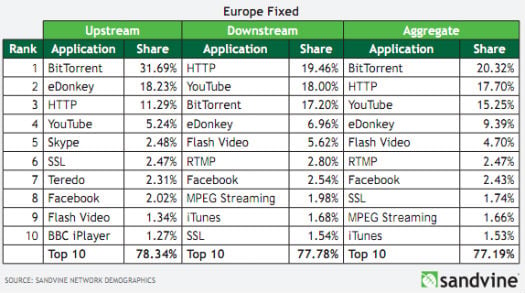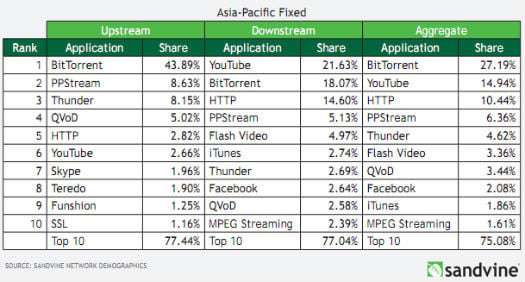BitTorrent Traffic Booms Due to “Licensing Challenges” | TorrentFreak.
In the U.S., BitTorrent’s share of total Internet traffic is falling sharply and the aggregate share of all P2P sharing applications is now at an all-time low of 12.7 percent. In other parts of the world, however, this trend is noticeably absent. In Europe and the Asia-Pacific region BitTorrent continues to surge. In part this difference can be explained by the lack of legal alternatives.
Over the years we have been following various reports on Internet traffic changes, specifically in relation to BitTorrent. One of the emerging trends is BitTorrent and P2P traffic as a whole losing its share of total Internet traffic, in the U.S. at least.
This downward spiral is confirmed by a recent¬ÝSandvine report¬Ýwhich reveals that BitTorrent traffic is now responsible for 11.3% of all U.S. Internet traffic during peak hours, compared to 17.3% last year. Although these numbers don‚Äôt take into account that absolute traffic has increased, it‚Äôs clear that there‚Äôs little to no growth in BitTorrent use.
However, this decline appears to be unique to the U.S. When we look at other regions a different pattern can be observed.
In Europe for example, BitTorrent traffic still accounts for 20.32% of all Internet traffic during peak hours, while eDonkey adds another 9.39% to the P2P total. During the last 18 months the share of P2P traffic nearly quadrupled, and this increase is even larger in absolute traffic.
According to¬ÝSandvine, the absence of legal alternatives is one of the reasons for these high P2P traffic shares.
“We see higher levels of P2P filesharing than in many other regions, at least partially due to geographical licensing challenges that restrict the availability of legitimate Real-Time Entertainment services.”
Europe: Internet traffic during peak hours

A similar trend is visible in the Asia-Pacific region where BitTorrent now accounts for nearly half of all upstream traffic and 27.19% of the aggregate Internet traffic during peak hours. The P2P streaming service PPStream and the Chinese file-sharing client Thunder add another 6.36% and 4.62% to the P2P total.
Asia-Pacific: Internet traffic during peak hours

So, while BitTorrent traffic is stabilizing in the U.S. as its share of Internet traffic drops, the P2P protocol is still hugely popular in other parts of the world.
Sandvine’s suggestion that a lack of legal alternatives is one of the explanations for this seems plausible. As we reported earlier this week, the latest episodes of series such as Game of Thrones are widely pirated on BitTorrent in countries such as Australia and the Netherlands due to airing delays.
In the U.S. on the other hand, the availability of legal content has flourished in recent years. To illustrate this, Sandvine reports that one-third (32.9%) of all downstream traffic during peak hours is now generated by Netflix subscribers. In addition, Hulu has doubled its share in the last year to 1.8%.
The above seems to suggest that due to these alternatives, people are less inclined to pirate.
The MPAA is slowly starting to realize that consumers are not all out to steal content, they simply want to consume.
‚ÄúI believe it‚Äôs critical to find solutions to the challenges facing both these consumers and the people who create the content. Because at the end of the day, this discussion is about consumers and by consumers who love TV shows and movies. They want to be able to access them quickly and safely online,‚Äù the MPAA‚Äôs Marc Miller¬Ýwrote yesterday.
True words, but Miller continues with a classic misunderstanding. “No business in the world can compete with ‘free’,” he notes.
As it turns out, the entertainment industry can definitely compete with free, up to a certain point. The crucial part is to remove all the artificial barriers. Release delays for TV and movies drive people towards BitTorrent piracy, just as DRM is an incentive to pirate rather than a deterrent.
The challenge for the entertainment industry in the years to come is not to invent ways to stop piracy but to make it less attractive, by ensuring that consumers get timely access to the content they want independent of their location, and on demand.
BitTorrent Traffic Booms Due to “Licensing Challenges” | TorrentFreak.





Sorry, the comment form is closed at this time.